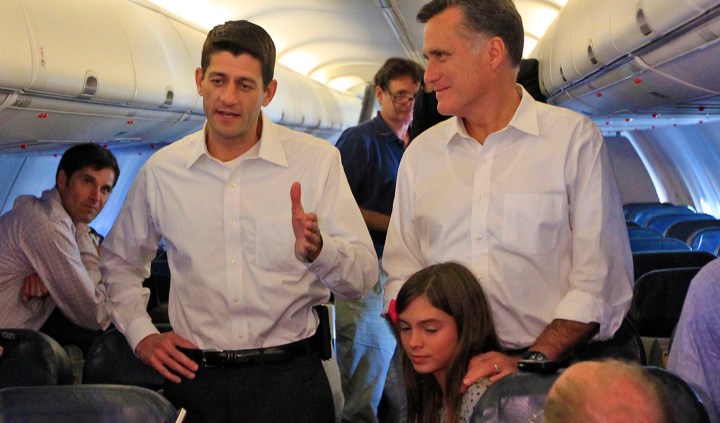World
US 2012: Romney-Ryan and the fortified ideological towers

After keeping his selection process ultra-secret for months, and following attacks about his finances, his business record and embarrassing miscues during his international debut, Republican presidential candidate Mitt Romney selected budget hawk Paul Ryan as his running mate. J. BROOKS SPECTOR takes a first look at the choice made by Romney and what it may portend for the election.
The sudden announcement came two weeks before the Republican National Convention will ratify the selection of Romney as the party’s presidential candidate and now Paul Ryan as his running mate. In making his pick, Romney has gone with a man who, at 42, is a generation younger has spent virtually his entire adult life in Washington, as a politician, a researcher at conservative think tanks and advocacy bodies and as a political aide. Ryan is most closely identified as creator of the Republican budget and tax plan that bears his name and that would, as the saying goes (and as Democrats hope the voting population agrees and profoundly dislikes) “end Medicare as we know it”.
The Ryan plan would significantly curtail a variety of social welfare entitlement programs and would reshape the nation’s Medicare program into a voucher system, putting the onus on the elderly to get the best possible deal for their available benefits. Democratic strategists are already labelling the Ryan initiative as one that would put this widely popular program “into a death spiral”.
Mitt Romney has moved past other potential figures like Condoleezza Rice, Marco Rubio, Jeb Bush and Chris Christie, as well as a number of other governors and senators, to reach beyond that layer of political experience to tap a congressman for this candidacy. In doing this, he is betting the more recent historical odds of picking a congressman or woman and going down to defeat in the fall election will not apply this time around. Still, the experiences of Barry Goldwater, Bob Dole and Walter Mondale all argue, other things being equal, the public does not expect congressmen and women to make the leap to vice president in one jump. More importantly, perhaps, by picking Ryan, Romney is betting that selecting him helps draw a firm a political distinction between him and Barack Obama.
In Romney’s campaign strategy, a Romney-Ryan ticket is assumed to energize the Republican hardcore, social conservative, anti-government base that has remained suspicious and wary of giving their enthusiastic allegiance to this year’s presidential candidate. Moreover, the Romney campaign is clearly hoping that it will energize this base to turn out to campaign and vote for the ticket on 6 November. There is also a clear hope that this ticket will draw that clean, clear distinction between Obama’s activist, interventionist government stance and a sharply limited government, pro-business posture of the Romney forces.
But there are risks, too. For one thing, in picking Ryan he has settled on a man who all but grew up in government service as a congressman and congressional staffer. On the face of it, this would seem to be antithetical to the Romney ethos that argues for the need for real, hands-on business knowledge to reenergize the sluggish economic recovery.
Moreover, Romney forces are betting their enthusiastic introduction of Paul Ryan as candidate will bleed into their national convention beginning at the end of August and thus counteract the shots the Romney machine has been taking over his personal finances, taxes and his less-than-stellar introduction to the world during his recent trip to the UK, Israel and Poland. This will be crucial for the GOP team, as polling data now show Romney slipping nationally in a face-to-face ballot against the president and national polls indicating most voters have no clear idea of who Paul Ryan is, or what he stands for.
In-depth voter surveys continue to show that while a plurality of voters say they feel more confident with Romney on economic policy-making, they like the president more and in the crucial battleground states the polls have generally been going Obama’s way.
Romney and his team may have their hands full introducing Ryan to the nation. Ryan is well-known among politicians, columnists and political activists for saying his political ideas were most influenced by libertarian writer Ayn Rand (even if he has now disavowed that view). Think something like a combination of the Daily Maverick columnist Ivo Vegter and Free Market Foundation guru Leon Louw to get the flavour of such a remark. And while Ryan is not well-known to most Americans, his budget proposals provide ample opportunities for Democratic candidates and their campaign surrogates to point to a whole range of programs identified for “zeroing out”, or sharp cuts, as well as tax provisions that are (or can characterized as) virtually an embodiment of the Obama campaign’s charges of soaking the poor and middle class in support of tax cuts for the rich.
Accordingly, introducing the candidate and then creating a Paul Ryan national narrative that is compelling and convincing will be a serious task—especially since he has only tussled in the midst of congressional infighting over tax and budget provisions and never before been on the national campaign stage.
Despite his relative obscurity to many voters, The New York Times noted that Ryan’s presumptive candidacy had been the subject of intensive lobbying by conservative strategists and media outlets. As The Times wrote after Ryan’s selection, “An editorial in The Wall Street Journal on Thursday said Mr. Ryan ‘best exemplifies the nature and stakes of this election.’ A similar column in The Weekly Standard said that there would be little downside to picking the young, energetic Mr. Ryan. ‘Romney, and Republicans, will be running on the Romney-Ryan plan no matter what,’ The Weekly Standard wrote.”
Despite these endorsements, GOP strategists are already jockeying for ways to open up some distance between the presumptive presidential candidate and Ryan’s eponymous budget plan to soften the blow from some of Ryan’s tougher-edged positions. As Romney spokesman Kevin Madden has already said, “Governor Romney is at the top of the ticket. And Governor Romney’s vision for the country is something that Congressman Ryan supports.”
Nonetheless, Ryan’s selection has clearly jolted the presidential contest landscape and set the contours for the fall campaign, with Romney championing a friendlier business climate to revitalize the economy and hold down federal spending and Obama defining himself as defender of the middle-class, health care, retirement pensions and education. However, the core of the campaign is still what it was before Ryan’s selection. The economy remains weak with unemployment seemingly settling in at 8%+ and how to deal with that is preeminent.
As Ryan was introduced as the GOP candidate, the Politico Web site summed up reactions from Republican and Democratic strategists with sharply divergent views. “‘I can’t remember the last election the GOP won when the issue dominating the discussion was entitlements,’ said one veteran Republican strategist. Meanwhile, as word of Ryan’s likely selection spread early Saturday morning, Democrats were all but giddy. ‘Vice presidential nominees almost never matter,’ said Bill Burton, who helps lead President Obama’s super PAC. ‘But if it’s the author of the most anti-middle class budget ever, this one does.’”
But it is in the election where it ultimately matters, and in electoral mathematics it still remains to be seen if Ryan as vice presidential candidate will have any real influence on the state-by-state race to produce the winning total of at 270 electoral votes. Analysts said that, at present, Ryan’s selection to help Romney reach that goal may only really affect the close race Ryan’s home state of Wisconsin. By contrast, proposals to cut major chunks from the federal budget and fundamentally alter Medicare could actually help Obama with crucial older voter demographics in older-than-national-average-population states like Florida, Ohio and Pennsylvania, all of which are as battleground states crucial for either party’s victory plans.
With the GOP’s ticket now settled, both parties are moving swiftly into the newest phase of the campaign. On Sunday, Romney and Ryan were off to rallies in North Carolina and then on to Waukesha, Wisconsin, where the stopover is billed as something of a homecoming for Ryan. Thereafter, Romney is due to head out to Florida and Ohio and Ryan to Iowa. Meanwhile, the president begins his own campaign swing with a three-day bus tour through Iowa while Vice President Joe Biden goes to North Carolina and Virginia.
As the Ryan as vice presidential candidate tour began in Norfolk, Virginia, on Saturday aboard the historic USS Wisconsin battleship, Romney said Republicans would present economic solutions “that are bold, specific and achievable”, creating 12-million new jobs and “bring better take-home pay to middle class families”. Ryan said Republicans would eliminate the nation’s “debt, doubt and despair”. (Somebody was clearly listening to an old speechwriter’s advice to always make one’s promises in threes because it sounds solid and reassuring.)
In response, Democratic campaign strategists and advisors took up the challenge, arguing that putting the man wielding the budgetary axe on the ticket would hurt Republicans with older voters, middle-income families and women in November. As Obama Campaign Manager Jim Messina wrote, “The architect of the radical Republican House budget, Ryan, like Romney, proposed an additional $250,000 tax cut for millionaires and deep cuts in education, from Head Start to college aid [and] his plan would also end Medicare as we know it by turning it into a voucher system, shifting thousands of dollars in health care costs to seniors.”
Somewhat gleefully, some Democratic party activists have been quoting none other than Newt Gingrich, the former House Speaker and one-time Republican presidential candidate, who had called Ryan’s plan to overhaul Medicare “right-wing social engineering”.
Watch for that one on a Democratic Party campaign ad (or two or three) on television stations and in social media outlets until 5 November. Say what you will, Ryan’s selection as Romney’s running mate has now drawn the distinction between the two candidacies in day-glo colours, and voters will have assuredly have a choice when they vote. DM
Read more:
- Mitt Romney Picks Paul Ryan as Running Mate at Politico
- Paul Ryan: Midwesterner, Catholic, intellectual in the Washington Post
- Romney Adds Ryan to G.O.P. Ticket
- Romney picks Paul Ryan as running mate in the Washington Post
- Romney picks Ryan as running-mate in the Financial Times
- In Romney and Ryan, a Pair Who Don’t Mind Their Differences in the New York Times
- Romney’s Mormon Story , Ross Douthat’s column in the New York Times
Photo: Republican U.S. presidential candidate Mitt Romney (R) stands with his vice president selection U.S. Congressman Paul Ryan (R-WI) and granddaughter Chloe while speaking to the press aboard a charter flight to Charlotte, North Carolina from Dulles Airport August 11, 2012. REUTERS/Shannon Stapleton



















 Become an Insider
Become an Insider